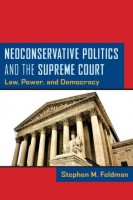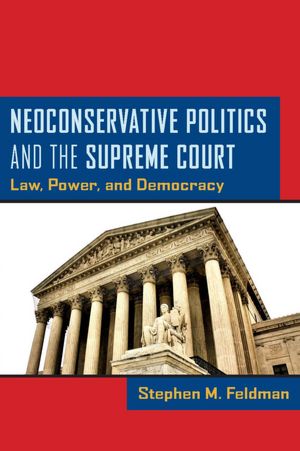 Author: Stephen M. Feldman
Author: Stephen M. Feldman
Publisher: New York University Press – 226 pages
Book Review by: Deekay Daulat
Stephen M. Feldman, a constitutional law expert and professor of law and adjunct professor of political science at the University of Wyoming who has written widely on the courts, conservatism, democracy, legal thought, law, religion, the separation of church and state, and related matters, writes in this book on the current neoconservative politics that dominate the United States Supreme Court.
He writes what the ‘entrenchment of neocons’ in the highest court in the nation means for the future of law and politics in the U.S.
Neoconservatives are a new breed of conservatives. Here is the basic belief of conservatives, as explained by the author: that the government and non-governmental entities should both promote traditional moral-religious values and an unregulated (or loosely regulated) economic marketplace that rewards individual merit.
On the other hand, liberals, some of whom call themselves ‘progressives’ believe that the government should not interfere in moral behavior of individuals and groups but should intervene in the marketplace “when necessary to promote equity.”
As a brief background to the reader, neoconservatives got on to the political scene in the early 1980s “via their assault on pluralist democracy’s ethical relativism where no preexisting or higher principles limit the agendas of interest groups,” as written on the inside of the jacket cover.
I believe what that means is that first, democrats who are pluralists are those have a set of beliefs but respect others’ opinions; and second, ‘ethical relativism’ means that something may be ethical to you may not be ethical to me, but nevertheless I respect your belief as long as it does not do physical harm to me.
So it seems like the pluralist democrats are very liberal with interest groups for whom no principles limited their agendas. It is almost as if they hold the belief that anything is possible with respect to interest groups’ desires. Neoconservatives abhor such free-wheeling attitudes and beliefs, which lead to similar behavior.
So what happened after the 1980s was that neoconservatives were constantly in conflict with the pluralist democrats but their ideas almost always prevailed in the clash, and influenced numerous decisions issued by the Supreme Court. What is surprising is that the neoconservatives often criticized their opponents but appeared as though they operated within a pluralist democracy.
One of the reviewers of this book, Richard Delgado, who is professor of law at Seattle University, writes that in this book: “A helpful explanation of the Supreme Court’s latest lurch to the right. By showing how many of the Court’s latest decisions can be seen as expressions of neoconservative impulse, Feldman exposes how deeply politics, personalities, and convictions shape judicial behavior.”
Stephen M. Feldman starts out this book by pointing out that prior to the 1930s, republican democracy was the dominant political outlook in the United States. That belief “declares that virtuous citizens and officials pursue the common good rather than their private interests,” explains the author.
In the 1930s however, he relates to us that a pluralistic democratic regime took hegemony (dominance) in the nation. This control persisted until the 1980s. We explained earlier what pluralist democrats’ attitudes and beliefs are. From the 1980s the neoconservatives dominated the Supreme Court.
In this book, the author basically paints a historic view of the past beliefs of the Supreme Court justices that have influenced and supported the various decisions of that august body, by tracing the evolution of the various isms. In so doing, he also presents his views on the future of the Supreme Court.
Among the books Stephen M. Feldman has written are: Please Don’t Wish Me a Merry Christmas: A Critical History of the Separation of Church and State (NYU Press,1997), Law and Religion: A Critical Anthology (NYU Press, 2000), Free Expression and Democracy in America: A History, and American Legal Thought from Premodernism to Postmodernism: An Intellectual Voyage.






